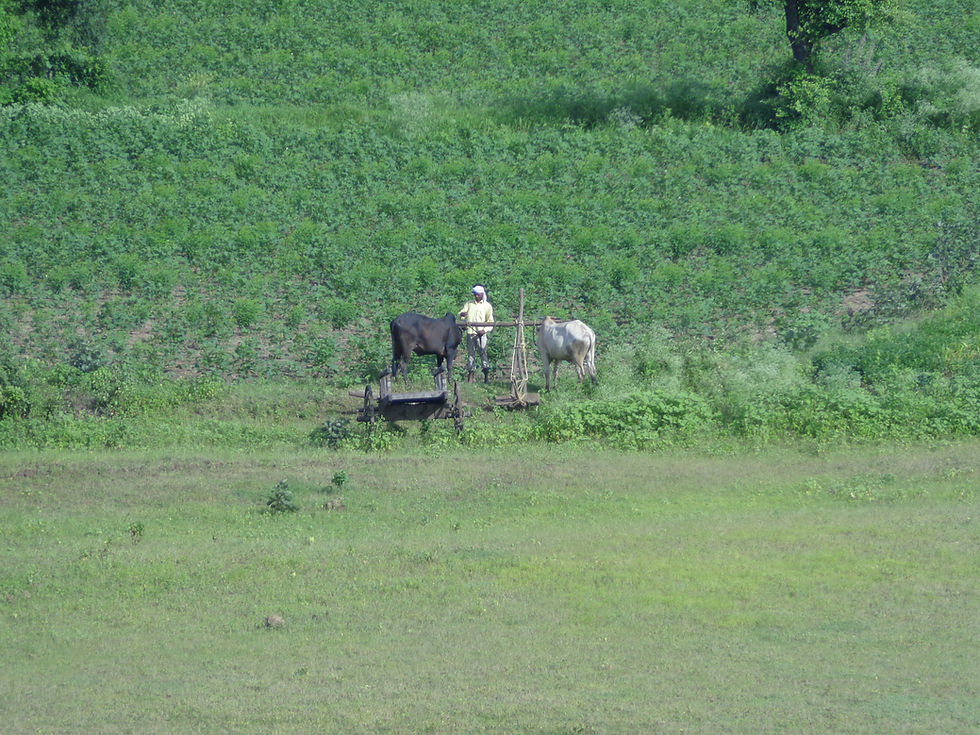The Maati-Paani-Asha Center – Critical Now. Essential for the Future.
- Sumeeta Gawande
- Jun 28, 2021
- 4 min read
Updated: Sep 27, 2021
In the last 20 years, over 300,000 farmers in the Yavatmal District of India have committed suicide. The need for deep transformation of the underlying agroecological system in this agriculture-based region is apparent. We are on our way to bringing about such transformation.

SESA has been working in Umarkhed, Yavatmal District, Maharashtra since 1987 to provide myriad educational resources and support to farmers and the broader community through Gopikabai Sitaram Gawande College (GSG College), a college SESA co-developed Our work has improved opportunities and wellbeing across gender, economic and caste divides and uplifted the lives of thousands of individuals. We are now leading a collaborative project at GSG College to transform the agricultural foundation in the region. We call it the Maati-Paani-Asha (Soil-Water-Hope) Center.
The MPA Center
The World Foodbank predicts a complete devastation of Central India’s agricultural production by 2050. Increasing temperatures and decreasing rainfall have depleted the resources needed to cultivate the Yavatmal region. With the use of fertilizers, unsustainable farming practices and a perpetual cycle of debt, farmers are seeing their livelihood disappear. In Yavatmal District (population 2.7 million), one farmer per day takes his or her life.
The purpose of the Maati-Paani-Asha Center is to break the vicious, interconnected & reinforcing cycles of climate change, environmental depletion, and poverty and, instead, establish cycles of regeneration, self-sufficiency, food security, and hope (irrespective of gender, economic status or caste) through several agroecological, technological, and educational initiatives that can be implemented locally and globally.

Our Maati-Paani-Asha Center will help ensure zero hunger, resiliency and the ability to thrive despite global warming. Farmers and the environment will be nourished, rather than depleted, and the community will experience good health and wellbeing.
Our solution will include:
Collaborating with local innovators with decades of experience transitioning farmers to non-chemical farming, growing kitchen gardens, and implementing methods that increase farmers’ income
Forming farmer study groups and working closely with farmers to implement agroecological, regenerative farming techniques;
Empowering women through training and support of female farmers
Increasing availability of diverse, indigenous food sources through family-supported kitchen gardens
Creating a model teaching farm on college campus
Interviewing farmers and elders to document indigenous food, livestock, and farming practices
Establishing an economic policy study group to evaluate existing markets and to model proposals for expanding market options
Collaborating with researchers specialized in civil engineering and water management to study water availability and model options for water resource management
Collaborating with regional experts to train villagers in water harvesting
Harnessing GSG College’s academic resources to conduct research and document project findings
Developing online educational courses to share knowledge gained locally and globally.
By establishing the Maati-Paani-Asha Center at GSG College, collaborating with local innovators, harnessing international resources, and implementing PRA methods, we will be able to create a better food future locally and globally. We will build a community with and empower local farmers to implement and co-design agroecological farming methods. We will scientifically collect data regarding the success and failures of our methods so that we can evaluate, improve and document them. We will create online courses from the knowledge gained so that local and global farmers can learn and implement our successes. Our researchers and study groups will design and model innovative methods, as well as test indigenous methods, for farming, food diversity, water management, value-added products, market development, and psychosocial support.
A Global Impact
At a 2009 United Nations Panel, experts revealed that food production must double by 2050 to meet the demands of the growing world population and combat hunger, which as of 2019, affects nearly 9% of the worldwide population according to actionagainsthungar.org.
With nearly 70% of the worldwide population directly or indirectly reliant on agriculture, it is crucial that we bring our project findings to a global audience. To do this, we have entered into a MOU partnership with EcoGather of Sterling College (Vermont), a collaborative international learning network dedicated to the regeneration of ecosystems, communities, and economies. EcoGather provides agroecological and education expertise and financial resources to create teaching assets and networked learning opportunities.

SESA's Maati-Paani-Asha project has been selected by Thought for Food, The Rockefeller Foundation, IDEO, and EAT into the Food Systems Game Changers Lab, a global program designed to bring together "game changers" who have ideas, initiatives, and innovations that will bring about positive change to global food systems. The Food Systems Game Changers Lab will support the first-ever UN Food Systems Summit the goal of which is to achieve Sustainable Development by 2030. The UN Food Systems Summit will bring together people and organizations from all over the world to "collectively help achieve a healthier, more sustainable, resilient and equitable food system".
Changing the Forecast and Looking Toward the Future
Unless something changes, the World Food Bank forecasts a complete devastation of the world’s agricultural food production by 2050. Therefore, it is essential that programs, such as the Maati-Paani-Asha Center, look toward the future as well as the present. Because of this, SESA is currently building an endowment that will allow us to fund the Maati-Paani-Asha Center through 2050. If you are interested in contributing to SESA’s endowment, click here.
Unfortunately, it is hard to grasp the severity of climate change when its effects aren’t readily visible or completely understood. What is understood, however, is if we fail to act now the threat to the global food supply chain will be irreversible. There must be a change and we can be part of that change! Our children and their children’s children are counting on us. By acting now, we can make a significant positive impact on the future of our planet, ensuring food security and a better way of life for generations to come.



Comments